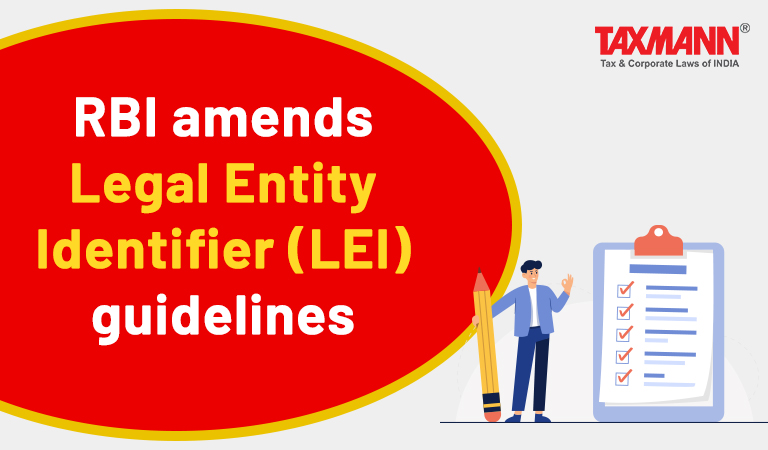RBI amends Legal Entity Identifier (LEI) guidelines
- Blog|News|FEMA & Banking|
- 2 Min Read
- By Taxmann
- |
- Last Updated on 24 April, 2022

Circular no. RBI/2022-23/34 DOR.CRE.REC.28/21.04.048/2022-23, Dated: 21.04.2022
Earlier, RBI vide Circular no. RBI/2017-18/82 DBR No.BP.BC.92/21.04.048/2017-18, Dated: 02.11.2017 has decided that the banks shall advise their existing large corporate borrowers having total exposures of Rs. 50 crore and above to obtain LEI codes as per the specified timelines mentioned in the schedule annexed to the Circular. Further, banks should encourage large borrowers to obtain LEI for their parent entity as well as all subsidiaries and associates.
Now, the RBI has decided to extend the guidelines on Legal Entity Identifier (LEI) to Primary (Urban) Co-operative Banks (UCBs) and Non-Banking Financial Companies (NBFCs). Further, RBI has advised that non-individual borrowers enjoying aggregate exposure of Rs. 5 crores and above from banks and financial institutions shall be required to obtain LEI codes as per the specified timelines annexed to the Circular. The term ‘exposure’ shall include all fund-based and non-fund-based (credit as well as investment) exposure of banks/FIs to the borrower. Aggregate sanctioned limit or outstanding balance, which is higher, shall be reckoned for the purpose.
Further, the RBI has clarified that Borrowers who fail to obtain LEI codes from an authorized Local Operating Unit (LOU) shall not be sanctioned any new exposure nor they shall be granted renewal/enhancement of any existing exposure. However, Departments/Agencies of Central and State Governments (not being Public Sector Undertakings registered under the Companies Act or established as Corporation under the relevant statute) shall be exempted from the provision.
Click Here To Read The Full Notification
Disclaimer: The content/information published on the website is only for general information of the user and shall not be construed as legal advice. While the Taxmann has exercised reasonable efforts to ensure the veracity of information/content published, Taxmann shall be under no liability in any manner whatsoever for incorrect information, if any.

Taxmann Publications has a dedicated in-house Research & Editorial Team. This team consists of a team of Chartered Accountants, Company Secretaries, and Lawyers. This team works under the guidance and supervision of editor-in-chief Mr Rakesh Bhargava.
The Research and Editorial Team is responsible for developing reliable and accurate content for the readers. The team follows the six-sigma approach to achieve the benchmark of zero error in its publications and research platforms. The team ensures that the following publication guidelines are thoroughly followed while developing the content:
- The statutory material is obtained only from the authorized and reliable sources
- All the latest developments in the judicial and legislative fields are covered
- Prepare the analytical write-ups on current, controversial, and important issues to help the readers to understand the concept and its implications
- Every content published by Taxmann is complete, accurate and lucid
- All evidence-based statements are supported with proper reference to Section, Circular No., Notification No. or citations
- The golden rules of grammar, style and consistency are thoroughly followed
- Font and size that’s easy to read and remain consistent across all imprint and digital publications are applied



 CA | CS | CMA
CA | CS | CMA
